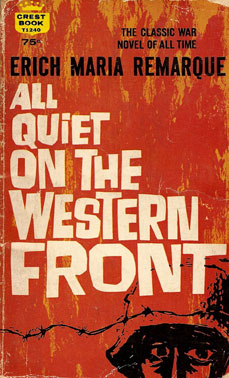Of this story, appearing in the Fall 2011 issue, writer Anthony Varallo recalls:
 I wrote “Think of Me and I’ll Know” during a time when I was writing a lot of short-short fiction, for reasons that still aren’t clear to me now, but likely have something to do with avoiding the novel I was working on at the time. The working title for the story was “All Quiet on the Western Front” (great title, but already taken, alas) and the story ran about five pages or so, a story about a guy who gets into an argument with his wife, goes to the library, recalls reading All Quiet on the Western Front in high school, goes home, and finds his son’s lost cat. The end.
I wrote “Think of Me and I’ll Know” during a time when I was writing a lot of short-short fiction, for reasons that still aren’t clear to me now, but likely have something to do with avoiding the novel I was working on at the time. The working title for the story was “All Quiet on the Western Front” (great title, but already taken, alas) and the story ran about five pages or so, a story about a guy who gets into an argument with his wife, goes to the library, recalls reading All Quiet on the Western Front in high school, goes home, and finds his son’s lost cat. The end.
I thought it was an okay story, but, at five pages, it both seemed too long and too short.
I tried cutting it down to a 500-word flash fiction (basically the library scene), but that didn’t work at all. So, I put the story away for a while, came back to it later, and started giving the narrator’s wife (a character who was little more than an “idea” in the early versions, I now realized) more scenes, more dialogue, more chances to tell her side of the story—and that’s when I started having fun writing “Think of Me and I’ll Know,” when I allowed the narrator’s wife to rise up and steal the show, at least for a little while. Her monologues are my favorite part of the story. They helped show me what might happen if I permitted the story to happily drift away from the original subject (alienated guy with problems large and small) and allow for other tunes, other keys, no matter how remote. A reminder, perhaps, that a writer really has little idea what he or she is doing, no matter how much we’d like to think otherwise. How little your story cares for your “plans” for it!
I’ve been lucky to have several amazing writing teachers in my life, but the best writing advice I ever heard came from my very first writing teacher, Bernard Kaplan at the University of Delaware, when, upon reading one of my undergraduate attempts at literary brilliance, full of symbol, irony, and what I thought was soaring lyricism, said, “Stop showing me how well-read you are, how funny you are, how clever you are, how sensitive you are, and just tell me a goddamned story.” I feel like I’ve been trying to live up to that wisdom ever since!


